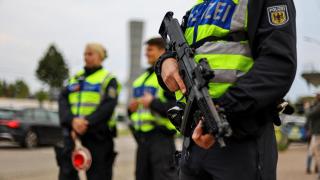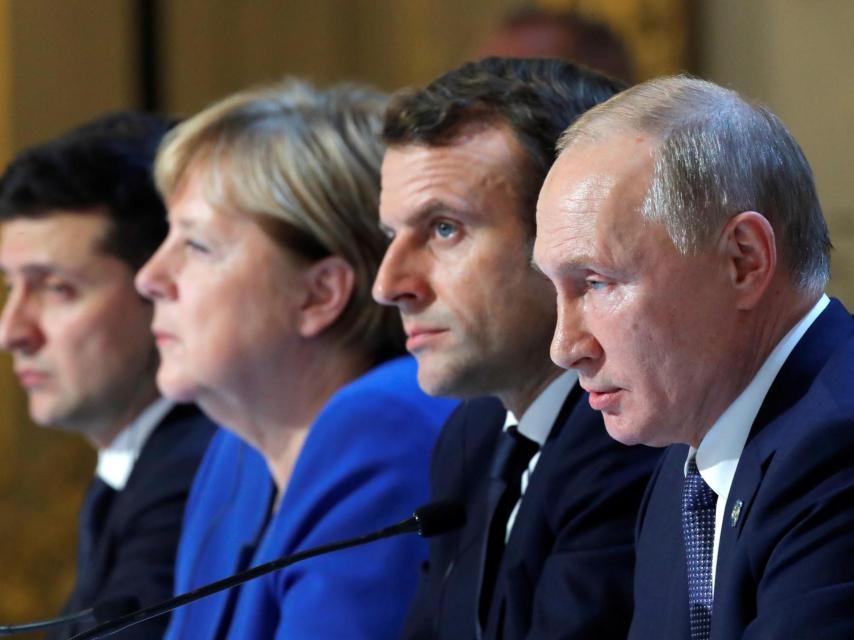Angela Merkel has shaped the history of germany. She was the first woman to reach the Chancellery and governed Europe’s economic locomotive for 16 years in a row. Four terms, between 2005 and 2021.
Now, almost four years after retiring, the conservative politician, who has refused to comment on current political events since leaving the Government, has launched to write his memoirs in a book titled Freiheit (Freedomin Spanish).
At the moment, little is known about what the work contains, which will be in bookstores this Tuesday, November 26. However, in recent days some pieces linked to his mandate and the relationship he established with leaders of other countries have been leaking.
Chancellor Merkel generates great media attention every time she speaks at a European Council
Georgia and Ukraine, in NATO
One of the first pieces of information that has come to light has to do with with Ukraine. Specifically, as the weekly progresses Die Zeitin her autobiography, Merkel defends her decision to prevent NATO’s entry into Ukraine and Georgia from being paved because feared aggression from Russia. It happened in 2008 during a summit in Bucharest in which Merkel frustrated the intention of some members to invite these two countries to develop an access roadmap to the organization.
“Ukraine and Georgia had requested that accession candidate status (known as MAP). A decision in Bucharest would not have automatically meant membership, but politically it would have represented something irreversible. It would have been the beginning of NATO’s third enlargement after 1999 and 2004,” explains the former chancellor. And this, he maintains, “Putin would have received as a yes to membership and as a challenge.”

“I thought it was an illusion to assume that MAP status would have given Ukraine and Georgia protection against Putin’s aggression, that this status would have had such a deterrent effect that Putin would have passively accepted the events,” says the former president. At that time, in addition, Russia had its fleet deployed in the Black Sea, near the ukrainian peninsula of crimeaillegally annexed in 2014. That same year, in the summer of 2008, Russia launched an invasion of Georgia.
Trump, Putin’s admirer
In his memoirs, which span 700 pagesMerkel also talks about Donald Trump, with whom she had a tense relationship during the Republican’s first term. Specifically, according to the German weekly, in her first meeting with Trump in 2017, the former German leader noted that Trump seemed “fascinated.” by autocratic leaders and said he admired Russian President Vladimir Putin.
Regarding that first interview with Trump, Merkel confesses that she did not let him “a good feeling”. And before their face-to-face meeting in the Oval Office of the White House, he ignored the request of journalists and photographers for another handshake, despite the suggestions of the chancellor of repeat the gesture performed in front of the entrance of the building.

Zelensky, Merkel, Macron and Putin, after a meeting in Paris in 2019.
During the conversation, Trump resumed your “usual” reviews against Germany, which he accused of having been ruined by hosting refugees in 2015 and 2016, of not investing in military spending and of adopting unfair trade practices. In turn, Merkel assures that she responded based on facts, but that she encountered someone who acted “emotionally” and only listened to their arguments to “transform them into new criticisms.” “Solving problems didn’t seem to be their goal,” observes the German. That frustration, of having to deal with other difficult leaders, even led her to seek advice from Pope Francis during a visit to the Vatican.
In favor of Kamala Harris
Angela Merkel has not stopped writing her memoirs until the last moment. For this reason, his book also includes his wish “with all my heart” that it was Kamala Harris, the Democratic candidate, who won the United States presidential elections on November 5. According to Die ZeitMerkel wanted to see a woman at the head of the most powerful country in the world. “At the time I write these lines, the result of the US presidential elections in November 2024 remains open,” Merkel maintains in its first pages.
The open door policy
The former chancellor also dares to talk about one of the most controversial decisions she made in the 16 years of her administration: that of having kept the borders open during the 2015 immigration crisis. And he does it to defend his position. “I had the feeling that, if we had not kept the borders open, all our speeches about European values and human dignity would have lost all credibility,” he explained to the magazine. Der Spiegel during an interview.
“La idea, por ejemplo, de parar a los migrantes con cañones de agua en la frontera alemana me parecía horrible y en todo caso no hubiera sido una solución”, ha añadido. Además, ha insistido en que la solución al problema de la migración ilegal tiene que ser una solución europea porque, sostiene, lo contrario puede llevar a “un retroceso de la integración europea de consecuencias impredecibles”.
En esta línea, Merkel ha aprovechado para distanciarse de la postura actual de su partido, la Unión Cristianodemócrata (CDU), liderada ahora por el candidato a canciller Friedrich Merz, que pide devolver en caliente a los inmigrantes en la frontera. “Me sigue pareciendo algo equivocado, es una ilusión creer que todo se resuelve si rechazamos a los inmigrantes en las fronteras alemanas“, ha señalado.
Críticas a la CDU
Ésta no es la única crítica que la exmandataria ha lanzado contra la formación que dirigió durante décadas. En su opinión, según las filtraciones, el bloque conservador, formado por la CDU pero también por la Unión Socialcristiana (CSU), debería mantenerse abierto a una posible coalición con Los Verdes de cara a las elecciones generales anticipadas que se celebrarán en febrero de 2025.
Esto supone que Merkel se pone en contra de la posición del jefe de la CDU y primer ministro bávaro, Markus Söder, que ha descartado en reiteradas ocasiones una alianza con Los Verdes. “No me parece correcta la forma en que Markus Söder y otros en la CSU y en la CDU hablan de Los Verdes”, ha indicado a Der Spiegel.




![[Img #74675]](https://thelatestnews.world/wp-content/uploads/2024/12/They-discover-a-new-class-of-X-ray-sources-in-the-150x150.jpg)







Add Comment